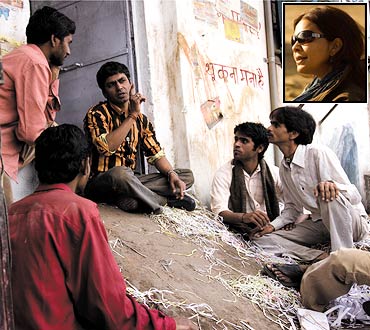
Anusha Rizvi is a former NDTV producer. In her first feature film Peepli Live -- produced by Aamir Khan, two poor, broken down farmers and brothers (Budhia and Natha) are about to lose their family land, since they are unable to repay the interest on the loan they have taken from a bank.
Things seem absolutely hopeless until the two hear that the government has developed a policy of granting Rs 100,000 to families of farmers who have committed suicides.
So begins a hilarious and a strange journey of the two farmers -- deciding which one will attempt to commit suicide, as the media and politicians descend on the village to benefit from the absurd situation.
In January Peepli Live was shown in the competition section at the Sundance Film Festival. A month after Rizvi took her film to 60th Berlin Film Festival, where the film was shown in the Berlinale Special section.
Rizvi spoke to Aseem Chhabra after the first screening of her film in Berlin.
This is a unique story and hasn't been explored in the commercial film world in Bollywood. Did it cross your mind while you were writing the script, how the film will get made?
Yes, that was a big deterrent. When I started to write -- and I wasn't trained in films, so it wasn't like something I wanted to do. I had left NDTV in 2003 and in 2004 I started thinking about making a documentary on children in jails.
I was looking for funding. That didn't happen, but then instead this idea came to me. It was primarily the idea that there are policies for farmers who are dead, but there is nothing for those who are still alive. And that is a repeated sense in the film.
We started with that and then it was a challenge where it could go. Juxtaposing that with so many Indias and bringing it together to see where it can fit in -- that's how it started. It was pretty much an experiment with an idea I was toying with.
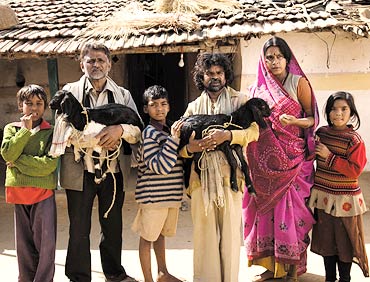
At what stage did you approach Aamir Khan?
I wrote an email to Aamir. I didn't know Aamir and (his wife) Kiran (Rao). I asked around and by chance someone gave me his email id. I wrote to him with the subject line The Falling (the original title of the film).
At that time he was working on the release of The Rising. So he thought it was a big joke. He actually opened it, read it and then replied.
In the email I had written a little bit about the plot and asked if he would be interested. He wrote back saying 'OK fine, why don't you send me the entire script.'
I started to work on the script and sent him the final draft. A whole year passed. We exchanged emails, but we didn't meet until the end of 2005 and I narrated the story to him. And he found it very fascinating.
Of course there was the issue of how I would manage it. He asked me 'How will you direct and how will it translate on the screen?'
So we were given five random scenes to shoot for two lakh rupees, with a video camera. We had friends act in the pilot. My husband Mahmood Farooqi (co-director and casting director of the film) played Natha. We shot it in the backyard of someone's house in Mumbai.
I send the DVD to Aamir and he called me the next day and said, 'Why don't you come tomorrow to the Tare Zameen Par set and we need to chat.' I asked, 'But have you seen it?' And he said, 'Oh, yeah, yeah. We've seen it and it's fine.'
How did Aamir trust you? I'm sure he gets scripts and is pitched ideas all the time. Why did he decide to work with you?
This question will have to be answered by him, but I think it had to be the story. And I would like to think that's his politics as well.
He never asked us to change anything or to tone it down. It is also a bit of risk for him as well. The film does deal with a lot of personal politics, doesn't it? So whoever is involved in it, they are certainly saying something.
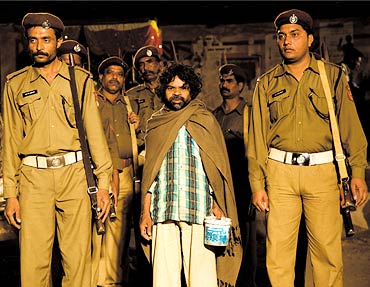
So you had this desire to bring up this issue, even though it seems as if hardly anyone other than P Sainath cares about farmers' suicides.
Yes, just imagine P Sainath is the only one talking about this issue. I do understand that people do not care about farmers' suicide, but people also do not care about rural India.
How many of our films show rural India and believe that India has a rural side. People just think about big cities -- Delhi, Mumbai, Bangalore. So have we come to a juncture where there will be one India for the rich and the other of the poor villagers?
And we will have visas and passports for the villagers to go into the world of rich Indians? That's something for us to think about.
The language you use in the film is raw, hilarious and somewhat shocking. Did you have no fear that you might offend somebody? Was it liberating to write it like that?
But that's how we talk in India. Andhey ko andha hee kehtay hai, langdey ko langda hee kehtay hai (We refer to blind people as blind and crippled people as crippled). We are as literal as that. It's Indian humour completely.
I have known people like that. The amma character (the mother of the two farmers) -- if you go to small villages, you will always find a cranky amma who'll rip you apart.
I am very fascinated with such characters. I want to explore a lot more of them. We have the most amazing characters in our country. It is so nice to be able to pick on them.
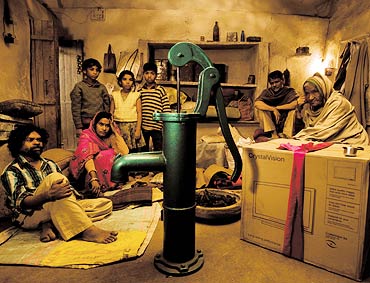
But you do not make fun of them. You don't demean them. I sense you have lot of respect for them.
These people are real people. Amma's dialogues -- that's how she talks. I did write some dialogues for the script, but I cannot take credit for her dialogues in the film. She added her own flavour and added life to her character and the dialogues.
The actress for amma's role, did you find her in the village?
No she's Farrukh Jafffer. She's a very educated Urdu scholar and a radio announcer from Lucknow who played the mother's role in Umrao Jaan.
At one point Habib Tanveer sahib -- who has been our guru and inspiration -- wanted to play amma. But he fell ill and we couldn't go through with that.
He would have played himself as a woman?
Yes!
As a TV journalist did you cover farmer's suicide stories? How did you know rural India so well? Where does this empathy for understanding farmers come from?
No I didn't, but I do know rural India a little bit because my family comes primarily from a village. We still have a little bit of land in UP. I do go back and know those people. But I'm definitely a city person. I grew up in Delhi.
I have a bit of a complicated family history. My father is a Gandhian who teaches Hindi and medieval poetry at Jamia Milia University. My grandparents were communists.
So I have grown up between Communists and a Gandhian and they have been the main anchors for how I see life and also have provided me with an interaction with rural India. I think it perhaps started there.
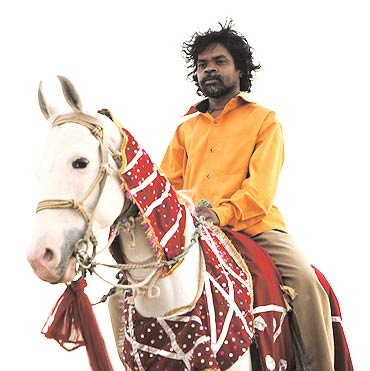
Did you like to direct?
I loved the actors. I hope it is not just the case with this film, but they were so supportive. You write and write, and then when the actor comes and reads the part and becomes the character you have created -- that's a such a fascinating experience.
How long was the shoot? And when did you shoot the film?
It was 64 days. We started on January 9, 2009.
How was the post production experience?
Editing, I think is my biggest strength. My editor Hemanti Sarkar had worked under Renu Saluja and we found a very nice space between us.
On the set you are dealing with 120 people. But in the editing room it was just two of us discussing and figuring out where we could tweak the scenes. Also this would not have been possible without my husband Mahmood.
There is a buzz about this film in India. You have only shown it in Sundance and Berlin. Martin Scorsese, Roman Polanski and Anusha Rizvi all have films here. How do you feel about it when you wake up in the morning and think, I have made this film and it is done?
Wow, thanks for reminding me that [laughs]. Now that you put it in those terms it acquires a completely different meaning for me. But I have not had time to breathe. I finished the film on January 6 and four days later we were in Sundance. There has been no breathing space at all. So it hasn't sunk in yet. But I am dying to know what the Indian reaction will be.
The experiences in Berlin and Sundance -- what has that been like? And you are being interviewed instead of you interviewing people?
Strange [laughs]. It's great to talk about the film and hear people's reactions. Sundance was nice. We had many more screenings and all sold out. On the thrid screening an older gentleman walked up to me and asked, 'In that scene, those two goats there, what were they called?' And I was stumped since I hadn't thought of names of the goats. He told me that he was small time farmer and he had goats of his own. I had not expected to find a man like him in the audience. This was something very satisfying for me.
What does Aamir think about the film?
He really likes it, I think.